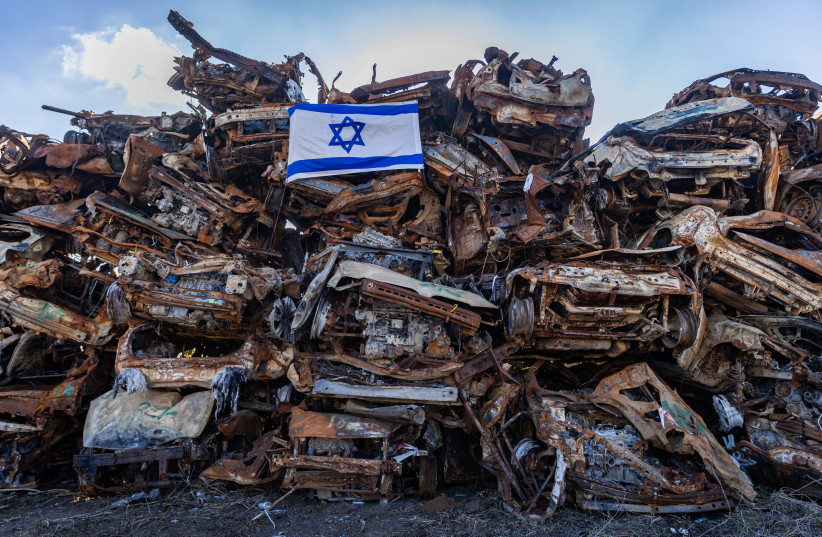On October 7, Israel was brutally attacked, but not just on one front. More than 1,200 of our people were slaughtered, raped, burned alive, maimed, and kidnapped in Hamas’s terrorist rampage. But in blasting its way across Israel’s southwest border, Hamas did not just demolish a physical barrier; it also struck a serious blow to Israel’s global reputation.
What was viewed as an impenetrable barricade, augmented by the type of hi-tech ingenuity for which the Start-Up Nation is famous (much of it military-inspired), was overpowered largely by basic materials and simple drones. On the spot, the brand name “Israel” lost much of its luster.
What was it that gave the region’s “superpower,” whose superior technology has attracted investors worldwide and propels its flourishing economy, an insurmountable edge?
Whatever post-war investigations uncover about the multiple failures by political and military leaders, among others, that contributed to the October 7 catastrophe, it’s fairly clear what will be at the heart of fixing them: the ordinary Israeli citizen.
It was 300,000+ ordinary Israeli citizens who rose up for reserve duty beginning on October 7 to defend our people and homeland against savage enemies. It was those very same ordinary Israeli citizen-soldiers – bitterly divided on judicial reform for months beforehand, with some even threatening to forsake reserve duty – who instantly set aside their differences and reported to their posts in order to fight alongside one another in brotherhood.

In parallel, their comrades on the “home front” stepped up big in their own way to feed, clothe, coordinate, shelter, deliver, volunteer, protect, mother, support, and live with gusto, bravery, and ingenuity. These Israeli citizens (along with their friends worldwide) sprang to action and demonstrated waves of kindness and charity, resilience, human invention and reinvention, and social entrepreneurialism on a scale that has not ceased to impress.
People of all stripes came forward to establish civilian “war rooms” to organize volunteer efforts, host displaced families, substitute as farmhands for foreign workers who fled the country, prepare and deliver food and supplies to our security forces, volunteer their professional services, and so much more.
NEARLY FOUR months later, our incredibly brave soldiers continue to fight to protect us with overwhelming resolve, moral clarity, and creativity (such as employing techniques designed to limit civilian harm as much as possible), despite facing enemies that value death over life and disgracefully and cynically use their own people as human shields.
And the remarkable efforts on the home front (joined by so many of our sisters and brothers from the Diaspora) have not waned either.
Israel's economy took a dive
To be sure, the economy is not where it was on October 6. Hamas’s attack and the ensuing war led to a fairly significant decline in foreign investment and international transactions in Israel during the final quarter of 2023 and since, negatively impacting corporate activity and the ecosystems that support business transactions (accountants, lawyers, consultants, analysts, venture and private equity funds, and banks, etc.).
Foreign investors looking at Israel still see war, significant labor shortages in the workplace, and a huge amount of government debt being accumulated to finance the war effort. Though there have been noticeable signs of recovery in some sectors of the economy following the initial shock of the October 7 massacre, foreign investment still remains significantly lower than in prewar periods.
We must also contend with the reality that the war appears far from over, and Israel’s stated aims – restoring security, freeing all hostages, and completely dismantling Hamas – seem far from achieved. We are still dealing with hundreds of thousands of domestic refugees, mounting physical injuries to and losses of our hero soldiers and fellow Israelis, international pressures due to the humanitarian toll on the side of our enemies, and an untold psychological toll on everyone. It’s hard to know when it will end.
But when it does, the key to Israel’s economic resurgence seems clear. If Israel’s brand name was bloodied and tarnished on October 7, it is the exceptionally resilient, ordinary Israeli citizen – the soul of Israel’s successful economy, who exhibited the type of grassroots leadership that portends well for Israel’s future – that will become the country’s new trademark.
Ordinary Israelis: there’s nothing ordinary about them.
Adv. Jeffrey Rashba and Adv. Ami Hordes are Jerusalem-based partners in the International Transactions Department of the S. Friedman, Abramson & Co. law firm.
